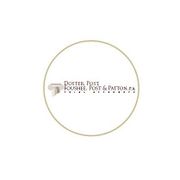Ask an Attorney: What Is a Wrongful Death Lawsuit?

When a person dies due to the fault of another individual or entity, the surviving heirs may be able to file a wrongful death claim. Such lawsuits seek compensation for various losses, including loss of companionship, wages, and funeral expenses. Below, the Sanford, NC, attorneys at Doster, Post, Foushee, Post & Patton, PA, offer a primer on wrongful death lawsuits—so you can enter the process with some prior knowledge.
A Brief Overview of Wrongful Death Lawsuits
What Is a Wrongful Death Claim?
Wrongful death claims exist when the death of a person is caused by the malicious action or negligence of another. These lawsuits involve a wide range of accident types, from auto accidents to product liability or medical malpractice cases. Individuals, governmental agencies, and corporations can be held liable for acting negligently (failing to act in a reasonable manner) and intentionally.
Who Can Be Sued?
Wrongful death claims can be filed against a broad variety of individuals, corporations, employees, and government agencies. For example, in a car accident involving a drunk driver and a faulty roadway, defendants may include the driver of the automobile, the builder or designer of the roadway, a government agent who failed to provide sufficient hazard warnings, and a bartender who sold and served alcohol to the drunk driver.
Who Can Sue?
Wrongful death claims must be filed by a representative on behalf of the survivors, or, “real parties in interest,” who have suffered damage due to the death. This representative is typically the executor of the decedent’s estate. The real parties in interest can vary depending on the state, but often include:
 Immediate Family Members: Spouses, children, and parents of unmarried persons are all eligible to recover damages in a wrongful death case. In a claim filed by a spouse, awards are usually divided between the spouse and children.
Immediate Family Members: Spouses, children, and parents of unmarried persons are all eligible to recover damages in a wrongful death case. In a claim filed by a spouse, awards are usually divided between the spouse and children.- Life Partners: In some states, those deemed financially dependent on the decedent may have the right to recover damages. Speak with a personal injury attorney to determine whether or not you are eligible.
- Distant Family Members: Distant family members, such as sisters, brothers, and grandparents, may be eligible to bring a wrongful death action. For example, a brother who is raising a younger sibling might be fit.
What Are Damages?
Real parties in interest may recover three types of damages in a wrongful death claim:
- Economic: Economic damages refer to financial contributions the deceased would have made to the survivors if they hadn’t passed. These can include funeral expenses, loss of benefits, and the value of services and goods the deceased would have provided.
- Non-Economic: Non-economic damages are typically more valuable than economic damages. Examples include damages for the survivors’ pain and suffering or mental anguish, loss of companionship, and loss of protection.
- Punitive: Punitive damages are often awarded as a means to punish the defendant for bad conduct. In some cases, punitive damages may also include reimbursement for attorney’s fees.
Filing a wrongful death claim can be a confusing and complex matter. If you have questions, concerns, or require the aid of a seasoned personal injury attorney, Doster, Post, Foushee, Post & Patton, PA, is the law firm to call. Visit them online or contact their office at (919) 775-5616.
About the Business
(3 reviews)
Have a question? Ask the experts!
Send your question

